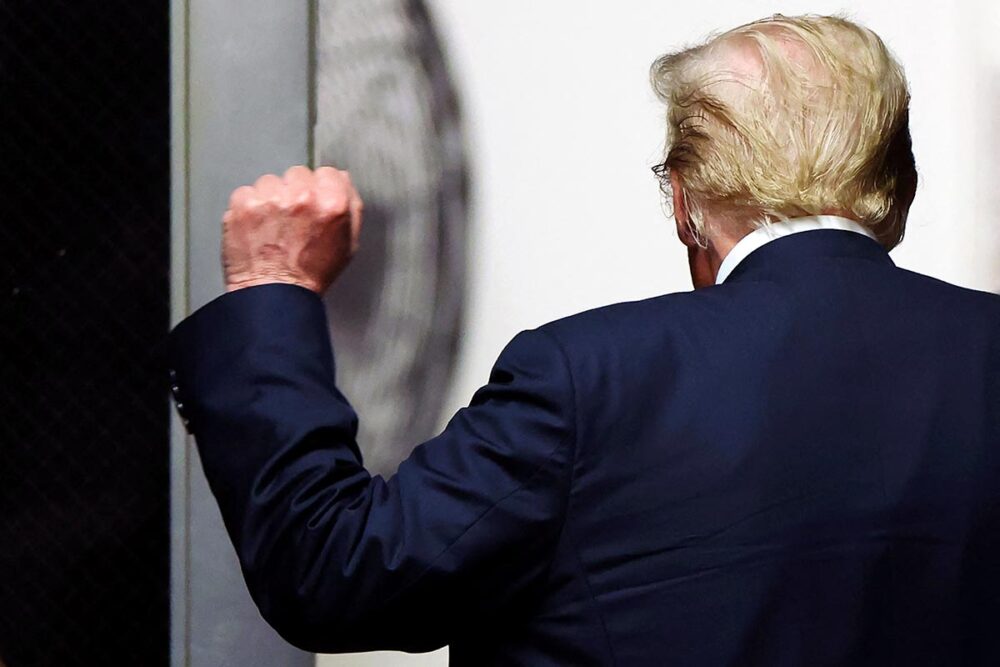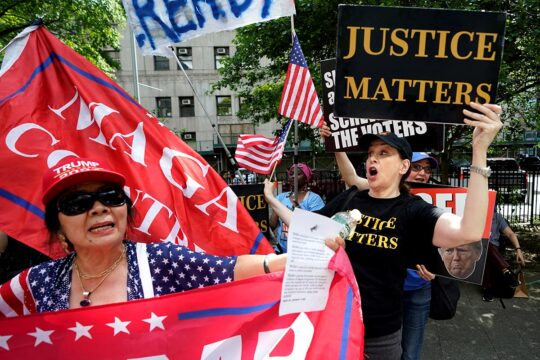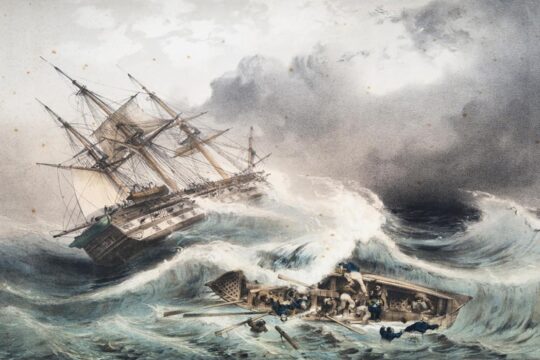“Next week we're introducing bipartisan legislation that will prohibit countries cooperating with the [the International Criminal] Court from engaging in business with America. This will fundamentally alter the existing paradigm, and I'm unmoved by whatever international pressure may come my way,” said U.S. Senator Lindsey Graham, in an interview to the newspaper Israel Hayom published on Jan 19, 2025.
Sanctions are officially designed to change behaviour, says Adam Keith, now director for accountability at Human Rights First, an NGO, and previously a senior policy advisor in the Office of Global Justice at the U.S. State Department. For the International Criminal Court (ICC), he says, “among the purposes of pushing the sanctions, is to make the ICC or its officials radioactive”. Sanctions from the United States work precisely because it has a lot of financial power: “If you're targeting individuals or the entity, an institution that is based in Western Europe, deeply integrated into Western economies, sanctions can be quite powerful in terms of convincing banks or other institutions not to do business with an institution or an institution that has individuals in it that are on the U.S. sanctions list.”
“If sanctions are imposed against you, all of your assets, all of your financial transactions in US dollars are frozen. And about 90% of all global financial transactions are conducted in dollars,” notes Milena Sterio, a law professor at Cleveland State University and managing director at the Public International Law and Policy Group (PILPG), a legal NGO. “So when they talk about sanctions, experts on sanctions call it a civil death for the individual who's sanctioned because of the burdens imposed on the person,” she says.
That is part of the intention, according to Todd Buchwald, former U.S. ambassador for global justice in the last year of Obama’s presidency and the first six months of Trump’s first mandate. “Financial institutions can be unwilling to conduct business with those subject to sanctions, even where doing that business is not actually covered by the sanctions,” he explains. “In other words, financial institutions – just as a matter of business prudence – have an incentive not to come any place close to the line and to just cut off relationships with the ICC.”
What's different than 2020
There are a number of elements that make the expected sanctions by the new Trump administration different from those Trump issued in 2020 in an Executive Order. [At press time, Trump has already reinstated his 2020 executive order on the first day of his new presidency, January 20, 2025, according to the Israeli press.] “This time around, it's gotten support from members of Congress. And then, unfortunately, 45 Democrats have voted for it,” notes State Department former legal adviser Harold Koh.
In traditional sanctions practice, “a company or an institution or an individual could be sanctioned if they do the sanctionable activity that's described in the Executive Order or in the legislation,” says Keith. In 2020 Trump drew on existing sanctions powers to issue his Executive Order. This time Congress may be providing a different authority. Sterio says the bill that has cleared the House and that “will in all likelihood be passed by the Senate, will be worse [than last time], because the sanctions regime is very broad”. She also points out that last time it was the president’s “discretionary authority as commander in chief to impose the sanctions,” whereas “this time this bill actually mandates that ‘the president shall sanction’. So if this bill becomes the law, the president's hands are tied”.
Will the U.S. target UK citizens?
The crux of the matter though is who Trump would actually sanction, Sterio says. “The president still has the discretion to say ‘I'm sanctioning individuals X, Y and Z’.”
In the current circumstances Karim Khan, the ICC prosecutor, is a British national. The two main individuals in charge of the Palestine investigation, standing behind Khan in his video announcing the arrest warrants last May, are Brenda Hollis, who is a U.S. citizen who cannot be put on a sanctions list because it's only for foreign persons, and Andrew Cayley from the UK. Will London use its close ally status to protect its citizens? “Many people believe that because we're talking about UK citizens,” says Sterio, “the president would not actually go after them. Last time around, we were talking about a Gambian [ICC prosecutor Fatou Bensouda] and a Lesotho citizen. Those are countries that the United States doesn't care about as much. But to actually sanction UK citizens would be an extra unprecedented move.”
Talking to other people in the field, Sterio says that “some folks hope that the president may actually be a lot more discreet in who he sanctions”. Therefore, she continues, “if we're talking about a more limited number of sanctioned individuals, then the court can continue to exist”.
However, Keith has one caveat regarding Hollis’ relative protection as a U.S. citizen: “As an American, if she continues to work for a prosecutor who is on the sanctions list, that could attract civil or criminal penalties in terms of sanctions enforcement by the Treasury Department,” he says. “And that's the sort of second-order effect.”
Could U.S. citizens continue to engage with the ICC?
The effects of sanctions on U.S. citizens would extend well beyond those Americans who work at the court to those who work alongside the court, explains Sterio: “If you help work with a sanctioned individual, you as an American citizen expose yourself to civil and criminal fines and penalties – civil fines of up to 250,000 dollars and criminal penalties of up to 20 years of imprisonment. So very, very serious penalties.”
So if certain individuals are put on the sanctions list and “a U.S. NGO provides tailored support to the prosecutor in the form of a brief for the prosecutor's use in an investigation, that can attract sanctions enforcement penalties,” Keith outlines. “Americans can't be put on the sanctions list, but can be hit in this other direction. So the effect is to criminalize basic forms of human rights advocacy when it comes to taking the documentation of your NGO and sharing it with perhaps the only court that has jurisdiction or the only court that's actually investigating in a situation.”
Last time in 2020, Sterio joined a group to challenge the sanctions because she, as a dual national, could have been prevented from providing “education, training, advice, and other forms of assistance to the ICC”, as well as to the sanctioned individuals. This time, that loophole – the vague term “foreign persons” in the Executive Order which could be read as dual nationals – has been closed. But she may still fight. “Even though I personally would not be at risk for being sanctioned, if I were to continue to engage with the court I would risk being fined in a civil way or being prosecuted and imprisoned. Many of us would be willing to sue again, because all the arguments from last time still stand. And then obviously the other avenue would be to just say for the next four years, I'm not really going to engage with the court. I think most of us would not want to do that. First of all, this is my work, this is what I do. But also out of principle, I think that's sort of the cowardly way out.”
A potential threat to the very existence of the court
Looking further around the court, Keith notes a number of key persons who might come into consideration for sanctions for their roles in enabling the Palestine arrest warrants, but whose nationality could make their governments react strongly. “One of the reasons we have argued the sanctions are such a bad idea,” he says, “is that this is pitting the United States against some of its closest allies because, apart from the prosecutor from Britain, the three judges from the pre-trial chamber [that allowed the arrest warrants] include a French person and a Slovenian. Many of the individuals who have publicly supported the prosecutor's investigation are also from major European allies.”
“The Congressional legislation is a little bit broader in its personal scope than the 2020 Executive Order,” explains Keith. “The 2020 Executive Order basically made it sanctionable for the ICC to investigate U.S. personnel or certain allied personnel. This legislation talks, instead of personnel, about ‘nationals and residents’. So it's much broader. And that's where some of the kind of bizarre overreach of the legislation comes in. It's because it's not just focusing on officials. It's anyone from the country or anyone even resident in the country.”
But if the sanctions are wider, then Sterio says it is a different situation. “Because what's really extremely scary this time around is that companies like, for example, Microsoft or interpretation services that provide assistance to the court, are exposing themselves to risk, too. And so they could say to the court, we don't want to work with you anymore. You know, this is just not worth the risk for us. And if that were to happen, then the court would have a really hard time continuing its existence. So everybody's hoping that it doesn't come to that, and that the number of actually sanctioned individuals is more limited. If it is, let's say, four or five individuals from the Office of the Prosecutor, then it's horrible for them, obviously, but the court can continue to exist.”
Would it affect the Philippines investigation?
Corridor discussions with diplomats at the annual meeting of the ICC early December in The Hague indicated how seriously the court and its supporters are taking the threat. Will the court’s bankers feel able to continue servicing the institution? How will salaries, security, and communications be funded and paid? “I would put the onus for having a ‘capital P’ plan on the ICC's member states,” says Keith. “You see a lot of NGO advocacy that is focused on encouraging States Parties to step up and defend the court and ensure its business continuity.”
“Presumably court officials and others are working to come up with workarounds and figure out a way to do business that doesn’t involve transacting foreign currency exchanges through New York,” says Buchwald. But “I don't know how successful they'll be”.
Keith says advocacy groups are using arguments about the overreach to speak against the legislation with lawmakers. The legislation may target any investigation by the ICC into any state that is an ally of the U.S. and not a party to the statute. “We oppose the legislation wholesale,” he says, “but there are particular ways in which it's bizarrely overreaching beyond the clear core intent of focusing on the U.S. and Israeli conduct. In particular, the other live investigation at the ICC that this legislation would make sanctionable for the ICC to engage in and for foreign nationals to provide certain support to is the Philippines investigation [The ICC is investigating alleged crimes against humanity committed in the so-called “war on drugs” under the leadership of former president Duterte]. And that’s why you see a lot of expressions of concern and alarm in recent weeks and months from Filipino activists.”
Similarly, “it would make it sanctionable for the ICC to investigate someone Turkish because they're from a NATO ally or an Egyptian or someone from any country that is defined as a major non-NATO ally. That's 16 countries, of which only around half have joined the court.”
The U.S. reputation
Buchwald believes the sanctions “can be very disruptive not just to the people who might otherwise be cooperating with the ICC but to the reputation of the United States as a supporter of the rule of law”. “Sanctioning professionals working on justice and accountability gives off an incredibly wrong message,” argues Kip Hale, founding director of the Association Bar Association’s ICC Project that focused on US-ICC relations. It “unjustly maligns an institution that has Americans and nationals from allied nations and committed justice professionals from elsewhere working there, a court that is heavily built on American ideals and principles.”
Up until now, says Keith, U.S. sanctions have been “a flexible and sometimes powerful toolkit,” whose legitimacy and usefulness have turned on an understanding that “the actions attracting sanctions are human rights abuses, serious acts of corruption”. That’s why NGOs have used the sanctions regime to target alleged human rights violators who seemed out of reach of criminal prosecutions. Keith now oversees Human Rights First’s work coordinating a coalition of NGOs that use the Global Magnitsky Act [a bipartisan bill passed by the U.S. Congress in 2012, intending to punish Russian officials] and other targeted sanctions tools to pursue accountability. “That's what we find so jarring and appalling to see the tool applied not against the alleged war criminals being investigated, but the officials, the judges, prosecutors, human rights lawyers doing the investigating. We just see it as a sort of fundamental ‘category error’ to apply it in this context in this way.”
Koh points out that “if you attack the court over Israel, you can't celebrate its results with regard to Russia and Ukraine. And we still need it for accountability against Russia”. “It's a very different signal from the Congress,” says Buchwald, “which passed legislation two years ago, with bipartisan support, affirmatively encouraging the U.S. Government to support the ICC investigation of the situation in Ukraine and providing funding for that support.”
Four years to survive
Koh speculates that some efforts could be taken within Congress to “narrow sanctions”. (At the time of publishing, the bill still has to go to the Senate.) But also Trump and his team can decide themselves anyway to issue an Executive Order. Koh points out that there may be opportunities provided by official visits to the United States, for either the UN General Assembly or the Security Council, for court officials to “tell the world how much the United States is hurting the court”. He speculates that “depending on who is a particularly needed ally at that particular moment for Trump, it might lead to hesitation in imposing these sanctions. People like Marco Rubio, who may at that point be U.S. secretary of state, and also Elise Stefanik, who has been mentioned as the new UN permanent representative in New York, are not moderating voices now, but they are more seasoned, and they could be moderating voices when the time comes”.
Apart from the qualitative differences between the 2025 sanctions and those five years ago, Keith says for him the major difference is “contextual”. “Last time the sanctioning administration had four months left in its term when it imposed actual sanctions. This time the sanctioning administration is going to have four years left in its term. And that's just categorically different in terms of the court's ability to survive, in terms of opportunities to escalate and make extorting demands. I think that's what is most alarming, most worrisome about the difference between last time and this time.”
The first part of this article, which looks at the history of USA/ICC relationships, is available here.








